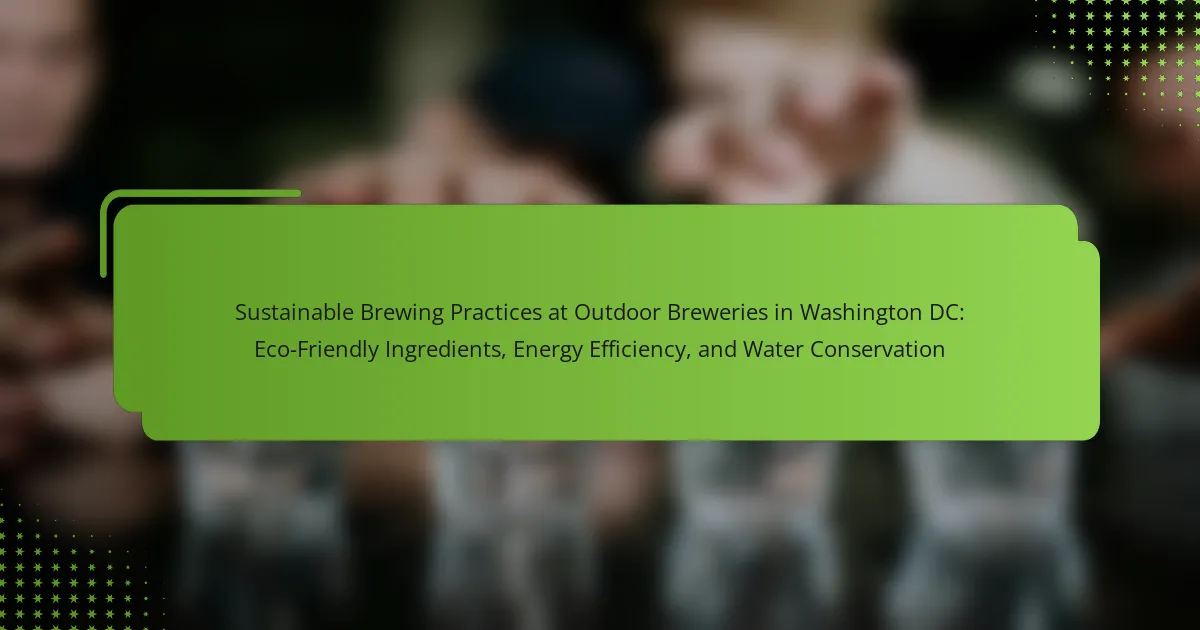Sustainable brewing practices at outdoor breweries in Washington DC focus on minimizing environmental impact through eco-friendly methods. These practices involve the use of organic grains and locally sourced hops, as well as energy-efficient brewing equipment and solar panels to enhance energy efficiency. Water conservation is prioritized through techniques such as rainwater harvesting and wastewater recycling. The Brewers Association highlights that these initiatives significantly reduce the carbon footprint of breweries. Additionally, sustainable landscaping in outdoor breweries supports local biodiversity, contributing to a healthier ecosystem while ensuring high-quality beer production.

What are Sustainable Brewing Practices in Outdoor Breweries?
Sustainable brewing practices in outdoor breweries involve methods that minimize environmental impact. These practices include using eco-friendly ingredients, such as organic grains and locally sourced hops. Energy efficiency is achieved through solar panels and energy-efficient brewing equipment. Water conservation techniques, like rainwater harvesting and recycling wastewater, are also implemented. According to the Brewers Association, these practices help reduce the carbon footprint of breweries. Outdoor breweries often incorporate sustainable landscaping, which supports local biodiversity. Overall, sustainable brewing practices contribute to a healthier ecosystem while maintaining quality beer production.
How do outdoor breweries implement sustainable brewing practices?
Outdoor breweries implement sustainable brewing practices by utilizing eco-friendly ingredients and energy-efficient processes. They often source local and organic grains to reduce transportation emissions. Many outdoor breweries use solar panels to power their operations, significantly lowering their carbon footprint. Water conservation is prioritized through recycling systems that minimize waste. Some breweries also implement rainwater harvesting systems to supplement their water supply. These practices not only promote sustainability but also enhance the quality of the beer. By focusing on these areas, outdoor breweries contribute positively to their local ecosystems.
What eco-friendly ingredients are commonly used in sustainable brewing?
Common eco-friendly ingredients used in sustainable brewing include organic grains, locally sourced hops, and wild yeast. Organic grains reduce chemical pesticide use and enhance soil health. Locally sourced hops minimize transportation emissions and support local farmers. Wild yeast, often harvested from the environment, promotes biodiversity and reduces reliance on commercial yeast strains. These ingredients contribute to a lower environmental impact and promote sustainability in brewing practices.
How does the brewing process adapt to sustainability goals?
The brewing process adapts to sustainability goals by incorporating eco-friendly ingredients and optimizing energy use. Breweries utilize local and organic grains to reduce carbon footprints. They also implement energy-efficient technologies, such as heat recovery systems, to minimize energy consumption. Water conservation techniques are employed, including closed-loop systems that recycle water during brewing. These practices not only lower environmental impact but also enhance product quality. Studies show that sustainable brewing can reduce water usage by up to 90%. This commitment to sustainability aligns with growing consumer demand for environmentally responsible products.
Why is energy efficiency important for outdoor breweries?
Energy efficiency is crucial for outdoor breweries as it reduces operational costs and minimizes environmental impact. Efficient energy use lowers utility bills, allowing breweries to allocate resources to other areas, such as quality ingredients or community engagement. Additionally, energy-efficient practices contribute to sustainability efforts by decreasing greenhouse gas emissions. For instance, according to the U.S. Environmental Protection Agency, energy-efficient systems can reduce energy consumption by 30% or more. This reduction not only supports the brewery’s bottom line but also aligns with eco-friendly initiatives that attract environmentally conscious consumers. Thus, energy efficiency is a key component in promoting both economic viability and environmental responsibility in outdoor breweries.
What energy-efficient technologies are utilized in the brewing process?
Energy-efficient technologies utilized in the brewing process include heat recovery systems, energy-efficient boilers, and automated brewing controls. Heat recovery systems capture and reuse heat generated during brewing, reducing energy consumption. Energy-efficient boilers operate at higher efficiency rates compared to traditional models, minimizing fuel usage. Automated brewing controls optimize energy use by adjusting processes based on real-time data. These technologies contribute to lower operational costs and reduced environmental impact in breweries.
How do energy-efficient practices impact overall brewery operations?
Energy-efficient practices significantly enhance overall brewery operations. They reduce operational costs by lowering energy consumption. For example, implementing energy-efficient equipment can decrease energy use by up to 30%. This leads to substantial savings on utility bills. Additionally, energy-efficient practices can improve production efficiency. Streamlined processes often result in higher output with less energy input. Furthermore, breweries adopting these practices can enhance their sustainability profile. This attracts environmentally conscious consumers. Research shows that breweries focusing on energy efficiency see improved profitability. Overall, energy-efficient practices create a positive impact on both financial and environmental aspects of brewery operations.
What role does water conservation play in sustainable brewing?
Water conservation is essential in sustainable brewing as it minimizes resource depletion. Breweries require significant water for production processes. Efficient water use reduces operational costs and environmental impact. Implementing recycling systems can decrease water consumption by up to 50%. Furthermore, conserving water helps protect local ecosystems. Sustainable practices enhance a brewery’s reputation and attract eco-conscious consumers. Studies show that breweries adopting water-saving technologies can improve overall sustainability ratings. Thus, water conservation plays a critical role in promoting responsible brewing practices.
What techniques are used to conserve water in the brewing process?
Techniques to conserve water in the brewing process include reusing water, optimizing cleaning processes, and employing dry hopping. Reusing water involves collecting and repurposing water from cooling processes. This practice can reduce overall water consumption significantly. Optimizing cleaning processes minimizes water waste during equipment sanitation. Breweries often implement high-efficiency cleaning systems to achieve this. Dry hopping reduces the need for water during the fermentation stage. Studies show that these methods can lower water usage by up to 30% in some breweries.
How does water conservation affect the quality of the beer produced?
Water conservation directly enhances the quality of beer produced. Reduced water usage leads to more concentrated flavors in the brewing process. This concentration can result in a richer taste profile. Furthermore, conserving water minimizes the risk of dilution. Dilution can negatively impact the beer’s overall character. Efficient water management also ensures consistent brewing conditions. Consistency is crucial for maintaining quality across batches. Studies show that breweries practicing water conservation report higher customer satisfaction. This satisfaction is often linked to the perceived quality of the beer.
How do sustainable practices benefit outdoor breweries in Washington DC?
Sustainable practices benefit outdoor breweries in Washington DC by reducing operational costs and enhancing brand reputation. Implementing energy-efficient technologies lowers utility expenses. Utilizing eco-friendly ingredients attracts environmentally conscious consumers. Water conservation methods decrease water usage, leading to lower bills. Sustainable practices also comply with regulations, avoiding potential fines. These breweries often experience increased customer loyalty due to their commitment to sustainability. Additionally, they contribute positively to the local ecosystem, fostering a healthier environment. This holistic approach not only boosts profitability but also supports community well-being.
What are the economic advantages of adopting sustainable brewing practices?
Adopting sustainable brewing practices offers significant economic advantages. These practices reduce operational costs through energy efficiency. Breweries can lower utility bills by using renewable energy sources. Sustainable methods also minimize waste, leading to reduced disposal costs. Additionally, eco-friendly practices can attract environmentally conscious consumers. This can increase sales and brand loyalty. Studies show that sustainable brands often see higher profit margins. For example, a report by the Brewers Association indicates that breweries implementing green practices can improve their financial performance. Overall, sustainable brewing practices lead to cost savings and increased revenue opportunities.
How do sustainable practices enhance the brewery’s brand image?
Sustainable practices enhance a brewery’s brand image by demonstrating a commitment to environmental responsibility. This commitment resonates with consumers who prioritize eco-friendly products. Breweries that implement sustainable methods often attract a loyal customer base. Research shows that 66% of consumers are willing to pay more for sustainable brands. Additionally, sustainable practices can lead to cost savings, which can be reinvested into marketing and community initiatives. This creates a positive feedback loop that strengthens the brand’s reputation. Engaging in community sustainability efforts also fosters goodwill and enhances local support. Ultimately, sustainable practices position a brewery as a leader in the industry, appealing to both environmentally conscious consumers and investors.
What challenges do outdoor breweries face in implementing sustainable practices?
Outdoor breweries face several challenges in implementing sustainable practices. Limited access to eco-friendly resources is a primary issue. Many outdoor breweries struggle to source sustainable ingredients locally. This can increase transportation emissions and costs. Additionally, outdoor settings may lack infrastructure for energy-efficient technologies. The variability of weather conditions also complicates energy management. Water conservation efforts can be hindered by local regulations and resource availability. Financial constraints often limit investments in sustainable equipment. Lastly, educating staff and customers about sustainability can be a persistent challenge. These factors collectively impede the adoption of sustainable practices in outdoor breweries.
How can outdoor breweries overcome these challenges?
Outdoor breweries can overcome challenges by implementing sustainable practices. Utilizing eco-friendly ingredients reduces environmental impact. Investing in energy-efficient equipment lowers energy consumption. Adopting water conservation techniques minimizes water usage. Collaborating with local farmers ensures a sustainable supply chain. Educating staff on sustainability promotes a culture of eco-consciousness. Engaging the community fosters support for sustainable initiatives. These strategies enhance operational efficiency and align with consumer preferences for environmentally friendly products.
What are best practices for outdoor breweries looking to adopt sustainable brewing methods?
Outdoor breweries should implement several best practices to adopt sustainable brewing methods. First, they can utilize renewable energy sources like solar or wind power for brewing operations. This reduces reliance on fossil fuels and lowers carbon emissions. Second, water conservation techniques are essential. Breweries can install water-efficient equipment and recycle water used in the brewing process. Third, sourcing local and organic ingredients minimizes transportation emissions and supports local agriculture.
Additionally, outdoor breweries can implement waste management strategies. Composting spent grains and recycling packaging materials can significantly reduce waste. Engaging in community initiatives promotes sustainability awareness and fosters local partnerships. Finally, monitoring energy and water usage through smart technology helps breweries identify areas for improvement. These practices not only enhance sustainability but can also lead to cost savings and improved brand reputation.
Sustainable brewing practices at outdoor breweries in Washington DC focus on eco-friendly ingredients, energy efficiency, and water conservation. These breweries utilize organic grains, locally sourced hops, and wild yeast to minimize environmental impact while maintaining beer quality. Energy-efficient technologies, such as solar panels and heat recovery systems, significantly reduce operational costs and greenhouse gas emissions. Water conservation strategies, including recycling and rainwater harvesting, enhance sustainability and improve brewing quality. Overall, these practices not only benefit the environment but also enhance brand reputation and profitability for outdoor breweries.
